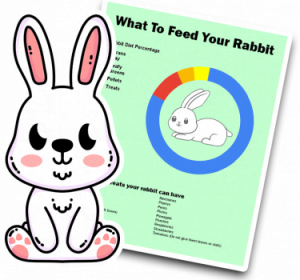
Are you curious about what the color of your rabbit’s urine means? You’re not alone! This is a question that many pet owners have, and it’s pretty easy to answer.
In this blog post, we’ll look at the different colors that rabbit urine can be and what they may mean. So, what color is rabbit urine? Keep reading to find out!
Typically, a healthy rabbit’s urine can vary in color from yellow to golden orange. However, if your rabbit’s urine is red, brown, or white, it’s worth discussing with your vet. While it could be normal for your rabbit, it’s essential to rule out any potential health issues. The presence of sand-like particles or blood in the urine can be a cause for concern, as it may indicate underlying health problems.
| Color Urine | Description of Urine | Vet Trip? |
|---|---|---|
| Golden / Yellow | This urine color is completely normal | No |
| Orange | Typically an orange hue will mean your rabbit is slightly dehydrated. Add some greens or extra water to their daily intake. | No |
| Red | Dietary changes normally cause this. | No |
| Clear | This is usually fine. However, if you’re having concerns, a trip to the vet is key as it can be a sign of kidney problems. | Yes |
| Brown | This is a sign of dehydration. Add some greens or extra water to their daily intake. | No |
| Calcium / White | This is a sign of excess calcium being excreted. If this is a regular occurrence, change their dietary plan and seek assistance from a veterinarian. | Yes |
| Sludge | This can be a sign of bladder stones. Seek a veterinarian asap. | Yes |
| Blood / Red Spots | This can have a multitude of reasons, the red may be due to a dietary change. However, if this is blood, seek veterinarian assistance asap. | Yes |
Yellow urine is considered healthy. This will either be yellow or a slightly darker yellow but not quite brown.
Red Urine is typically a sign of a dietary change and is rarely an issue. This is commonly noticed when your rabbit’s urine is even red throughout rather than red or dark red spots. If this is blood, you will usually see this as blotches or spots of red. Red urine can come as a result of the following:
When in doubt, you can take your rabbit to a veterinarian for a urine sample (Urinalysis) which will help determine if there is blood in the urine and if it is fatal. This can lead to x-rays of your rabbit’s abdomen for signs of bladder stones or calcium sludge in the bladder and ureters/urethra.
Like yellow urine, Orange and Brown urine is considered fairly healthy and not a sign of any issues. If your rabbit’s pee is orange or brown they will need more liquids in their diet as it is a sign of dehydration.
If your rabbit isn’t showing signs of issues such as hunching, struggling to breathe, or being lethargic, they may not want to drink yet. You can help keep your rabbit hydrated easily with the following methods:
If your rabbit’s urine is white or slightly milky, this can simply be excess calcium being excreted. Your rabbit shouldn’t have any issues absorbing calcium due to having a higher blood calcium level than most animals. This is due to calcium’s nutritional benefits, which can be passed through urine.
A common sign of this is a high percentage of alfalfa hay rather than Timothy hay. Once your rabbit is three months or older, we recommend swapping them to timothy hay products rather than alfalfa.
If your rabbit has regular excess calcium for an extended period, you should take your rabbit to a veterinarian to make sure they are not building up calcium crystals which can lead to a urinary tract infection.
Yes, specific diets can lead to abnormal urine in rabbits. For example, a diet high in calcium can cause bladder sludge.
It’s a good idea to check your rabbit’s urine every day. This will allow you to spot any abnormalities early on.
Seek veterinary attention immediately. This could be a sign of a serious underlying health issue.
Yes, stress can lead to changes in a rabbit’s urine. If you notice any abnormalities in your rabbit’s urine, consider whether stress is a factor.
While not all cases of abnormal rabbit urine can be prevented, you can take steps to promote your rabbit’s overall health. This includes providing them with a healthy diet, fresh water, and a clean living environment

By entering your email address you agree to receive emails from Cottontailclub. We'll respect your privacy and you can unsubscribe at any time.